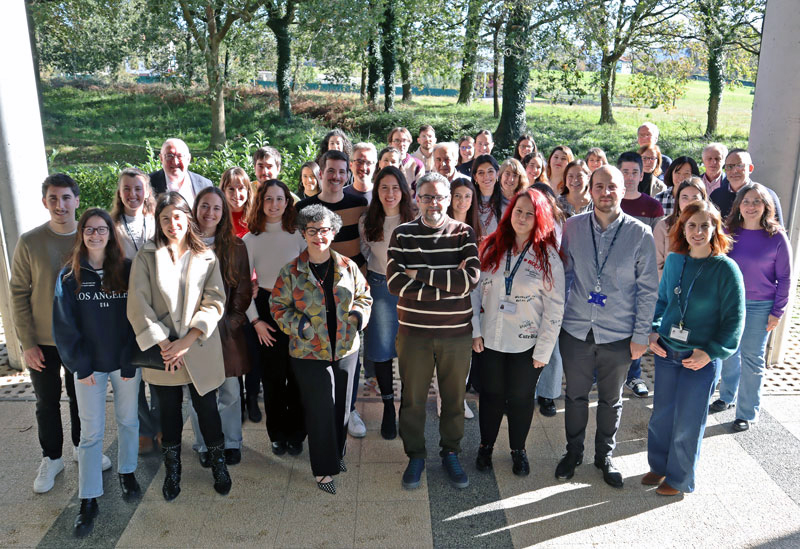
2024/11/29
CIC bioGUNE hosts the Annual Meeting of the Spanish Hypoxia research group
CIC bioGUNE, member of BRTA, hosted this year’s Annual Meeting of the Spanish Hypoxia Research Group, HypoxiaNET.es, on November 28th and 29th. This event brought together leading experts and international references in the field of hypoxia, with the goal of fostering collaboration and exchanging ideas among top researchers studying the mechanisms of adaptation to oxygen deficiency—a crucial process in modern biomedicine.
Since its emergence in the atmosphere nearly 2.5 billion years ago, oxygen has been essential for the development of life as we know it. Organisms have developed sophisticated mechanisms to adapt, react, and ensure oxygen homeostasis under different conditions. However, its deficiency, known as hypoxia, can have devastating consequences—not only during transient physiological episodes such as acclimatization to high altitude or physical exercise but also in chronic diseases like cancer, metabolic disorders such as diabetes, inflammatory diseases like Crohn's disease, neurodegenerative conditions like Alzheimer’s and Parkinson’s, and ischemic diseases such as heart attacks and strokes.
Research into how organisms respond to hypoxia is one of the most promising areas in biomedicine, with immense potential to transform the diagnosis and treatment of many prevalent diseases in contemporary society. “Despite the Nobel Prize in Physiology or Medicine awarded in 2019, the field of hypoxia and the study of adaptation mechanisms are once again in a state of great excitement. The promise of new discoveries and treatments for high-impact diseases in our society makes this an incredibly attractive field of research. Once again, we have had the opportunity to discuss and share our results in a close environment with researchers at the forefront of international research in this field,” noted Edurne Berra, Associate Principal Investigator in the Cancer Signalling and Metabolism Lab at CIC bioGUNE and coordinator of HypoxiaNET.es.
Founded in 2014, HypoxiaNET.es aims to bring together the most relevant research groups in the field of hypoxia to foster scientific collaborations, optimize resource acquisition, and encourage critical discussions about advancements in this area. At this annual meeting, participants were able to exchange results and explore new opportunities in both basic and applied research.
The event was attended by researchers from a wide network of institutions, including universities (Autonomous University of Madrid, Complutense University of Madrid, University of Jaén, University of Oviedo, University of Salamanca, University of Seville), hospitals (Hospital Clínic and Vall d’Hebron in Barcelona, Hospital de la Princesa), and research centers (CIB-CSIC, CIC bioGUNE, IBiS, IBSAL, IIB-CSIC, IPB-CSIC), all with a strong track record in basic and translational research.
The HypoxiaNET.es group also stands out for its involvement in the European Hypoxia Network, HypoxEU, and has been recognized and funded twice as a Network of Excellence by the Spanish Ministry of Science, Innovation, and Universities. This recognition highlights the importance of hypoxia research and its impact on the international scientific landscape.
The meeting provided a unique opportunity for HypoxiaNET.es members to consolidate their work in a highly competitive scientific area and continue leading the way in research on the body’s response to hypoxia—an area that, with current scientific advances, promises significant progress for the medicine of the future.
About CIC bioGUNE
The Cooperative Research Centre in Biosciences (CIC bioGUNE), a member of the Basque Research and Technology Alliance (BRTA), located in the Bizkaia Technology Park, is a biomedical research organization conducting cutting-edge research at the interface of structural, molecular, and cellular biology, with a particular focus on generating knowledge about the molecular foundations of diseases, for use in the development of new diagnostic methods and advanced therapies.
About BRTA
BRTA is an alliance of 4 collaborative research centers (CIC bioGUNE, CIC nanoGUNE, CIC biomaGUNE, and CIC energiGUNE) and 13 technology centers (Azterlan, Azti, Ceit, Cidetec, Gaiker, Ideko, Ikerlan, Leartiker, Lortek, Neiker, Tecnalia, Tekniker, and Vicomtech) with the main goal of developing advanced technological solutions for the Basque business sector.
With the support of the Basque Government, the SPRI Group, and the Foral Councils of the three territories, the alliance aims to promote collaboration among research centers, strengthen the conditions for generating and transferring knowledge to companies, contributing to their competitiveness, and promoting the Basque scientific-technological capacity abroad.
BRTA employs 3,500 professionals, accounts for 22% of R&D investment in the Basque Country, generates annual revenues of over 300 million euros, and files 100 European and international patents per year.
See a large version of the first picture





